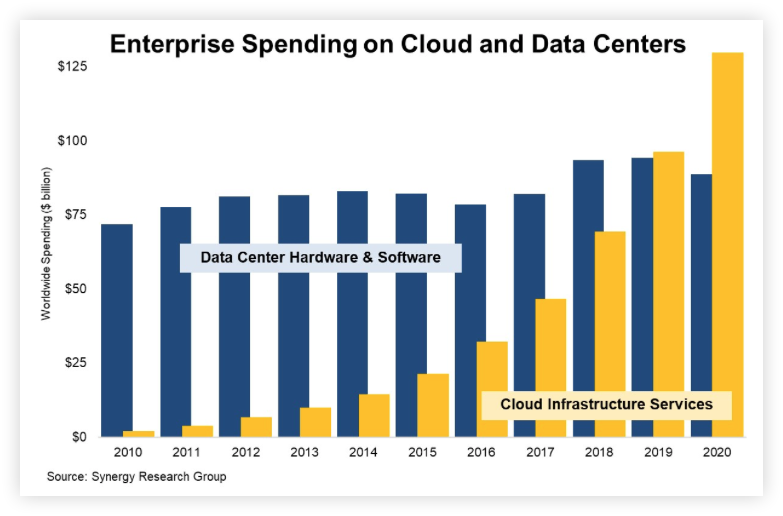The ‘self host vs cloud’ debate has been a staple of software selection decisions for the best part of the previous decade. But where do things stand now, in 2021?
On the face of it, cloud seems to be taking the upper hand. According to a report by Synergy, cloud infrastructure spending surpassed on-premise spending significantly in 2020 – and whilst cloud services experienced stratospheric 52% growth over the last decade, on-premise deployments stagnated, with just 2% growth over ten years.

(Image source: srgresearch.com)
Yet, whilst the market in general is definitely shifting towards the cloud, does that make it the best option for your employee intranet platform? Can you guarantee, for example, that your cloud partner will offer the level of security you find acceptable?
One way of navigating such concerns is to self host your intranet, by which we mean housing your intranet on your own internal servers.
Both cloud and self-hosted solutions have their pros and cons. Rather than moving with the market for the sake of it, it’s essential to weigh each of these options against one another with regards to your specific intranet project.
Below, we run through the three main advantages to self hosting your intranet solution.
You retain more control when you self host your intranet
Perhaps the biggest advantage you gain when you self host your intranet is control.
You may have to spend more on security or ramp up your current provisions, but you know exactly where your data is, how it’s maintained and who has access to it. Or at least you should do, if you have the right security processes in place.
This makes it much easier to maintain compliance with increasingly stringent data protection initiatives like GDPR, and to guarantee your data is protected to the degree you’d like it to be.
For example, 91% of cloud service providers do not encrypt data at rest. If your employees work in sensitive industries like healthcare or defence, this might not be good enough to protect the data you need your intranet to hold.
If you can meet the security needs of your intranet in house, why entrust them to an external provider?
You can customise your intranet more easily
Your workforce is unique. Whilst SaaS intranet solutions might be quick to deploy, you won’t be able to tailor your solution to those unique needs.
If you self host your intranet, you open up a lot more scope for customisation. This is particularly true if you’ve built your own solution yourself from scratch or have had one created for you by a software development company.
A tailor-made intranet makes it significantly easier to add new features or integrate new tools as you need them, rather than having to wait for vendor updates, hoping that they include those crucial integrations you need.
You can save money in the long term
It’s tricky to give a definitive answer to whether a self-hosted intranet is cheaper than a cloud-based intranet because there are so many different variables.
It’s fair to say, however, that in the right circumstances you could make long-term savings when you self host your intranet.
A self hosted intranet requires an established and knowledgeable IT team with the experience to set up and run your intranet securely. It also requires an on-premises data centre or server room for the hosting itself.

Have a server room in your office already? Then you might benefit from hosting your intranet on-premise.
If you have these elements in place already, it might be more cost-effective in the long term than paying a monthly fee, particularly on a per-user basis.
Remember, cloud solutions have hidden costs. As well as the software itself, you may need to pay additional costs like hosting fees and customer support to your vendor. These can sink your software budget unexpectedly and make the cost difference between cloud and self-hosting less drastic than it might seem at first.
…But what about the disadvantages?
In the right circumstances, a self-hosted intranet can be a perfect fit for your organisation’s needs.
That said, self host solutions have their drawbacks too. In some cases, external intranet hosting will be a better fit for your organisation. This is especially true if:
- You don’t have the budget to build up your in-house IT infrastructure, or to maintain full-time in-house technical support
- You need to offer remote access to your intranet to a large number of employees – if you have a popular work-from-home policy or large numbers of non-office-based employees, for example
- You need an immediately deployable intranet solution to fill an urgent communications issue
- You have no real need for extensive customisation and would happily work off low-code templates to build something that works well for you
It’s also worth considering how the market for intranet software will develop in the next few years. Demand is leaning towards cloud solutions right now – particularly in the wake of COVID-19, where speed, adaptability and remote working have been essential in keeping workforces productive.
If you want to take advantage of innovations in the space, like enhanced workforce analytics or integrated video chat solutions, cloud computing is where you’ll need to focus.

![[FREE GUIDE] SaaS and In-House Intranet Hosting: What You Need To Know](https://no-cache.hubspot.com/cta/default/5025095/34b9436f-293e-4e8d-a714-d9458d273f8c.png)




